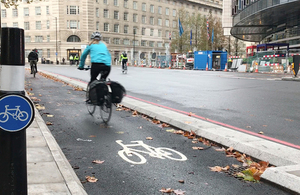Bold new measures to keep people safe on the roads
Measures to combat road rage, encourage more mutual respect between road users and protect the vulnerable released in 2 year action plan to improve road safety.

Picture of cyclists on a road.
- government publishes 2 year action plan to improve safety of vulnerable road users
- funding boost for police use of video evidence, and new 15% local infrastructure investment goal
- minister Jesse Norman announces search for new cycling and walking champion, to promote cycle and pedestrian-friendly policies
A number of ground-breaking initiatives have been announced as part of a 2 year action plan to improve road safety.
The 50 proposed new measures are part of the government’s plan to combat road rage, encourage greater mutual respect between road users and protect the most vulnerable.
Councils will be given powers to tackle dangerous parking in mandatory cycle lanes, and will also be encouraged to spend around 15% of their local transport infrastructure funding on walking and cycling.
Cycling and Walking Minister Jesse Norman said:
Greater road safety— and especially the protection of vulnerable road users such as cyclists, pedestrians and horse riders – is essential.
We want to improve air quality, encourage healthy exercise, reduce obesity and boost our high streets and economic productivity.
That means more support for cycling and walking, and that’s why these new measures are designed to deliver.
As part of the action plan, a bespoke new back office unit will be set up so that police can analyse video evidence submitted by the public. This builds on the success of Operation Snap – a successful programme first piloted by North Wales Police in 2016 – and will allow police to handle video and photographic evidence submitted via dash cams.
The Department for Transport (DfT) will also appoint a new cycling and walking champion, to ensure new policies meet the needs of road users across the UK, and will host a new 2019 Bikeability Summit encouraging businesses to promote cycling and walking schemes to their employees.
Joshua Harris, director of campaigns at Brake, the road safety charity, said:
People who choose to cycle or walk should be able to do so in a safe and welcoming environment; active travel is not only great for personal health but public health too. With cyclists and pedestrians among the most vulnerable on our roads, safety, and the perceptions of safety, need to be addressed to encourage more people to leave their cars at home and get active. We welcome the government’s action plan, which couldn’t be more timely as people across the country are encouraged to be more #BikeSmart for national Road Safety Week.
Joe Irvin, Chief Executive, Living Streets said:
Too often people walking pay the ultimate price on our roads. This is unacceptable and we need opportunities like this to make our roads safer.
Looking to improve the Highway Code for walking and cycling, and appointing a cycling and walking champion can help make our streets safer for everyone.
Lower speed limits in urban areas, more time to cross at light-controlled crossings, better street maintenance and constraints on pavement parking can all help encourage people to choose these cleaner and healthier ways to travel.
The action plan will also assess whether insurance companies could offer discounts to drivers and motorcyclists who have passed Bikeability training. The DfT will work closely with courier companies to explore incentives for drivers who undergo training in driving safely alongside cyclists, pedestrians and horse-riders.
The action plan builds upon the feedback of more than 14,000 people, including organisations such as Brake, Living Streets, Cycling UK and the British Horse Society – who responded to the Cycling and Walking Investment Strategy Safety Review call for evidence.
We are seeking to make cycling and walking the natural choices for shorter journeys, or as part of a longer journey, by 2040. Since the strategy was published, councils and metro mayors have allocated an additional £700 million to active travel initiatives, with almost £2 billion being invested in this area over this Parliament.
The government announced that it would review guidance in the Highway Code on how road users should behave in relation to cyclists and pedestrians, as well as other vulnerable road users. The review will be conducted in consultation with all key stakeholders, including those representing equestrians.
News desk enquiries
Media enquiries 0300 7777 878
Switchboard 0300 330 3000